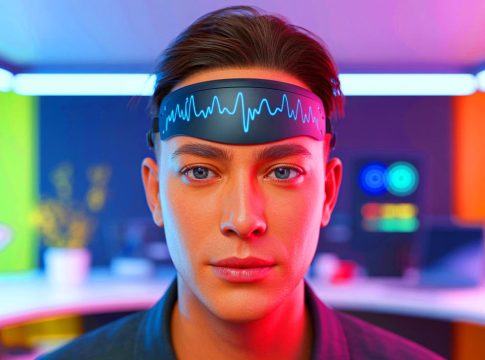A New Dawn for Mental Wellness: Wireless Forehead Tattoos
In the landscape of mental health innovations, a recent development shines brightly: a wireless electronic forehead tattoo that tracks and anticipates mental fatigue in real-time. This novel approach combines technology with compassion, offering us deeper insights into cognitive health.
What is the E-Tattoo?
This ultra-thin, flexible device adheres to the forehead much like a temporary tattoo. It functions by measuring electrical activity in the brain through techniques known as electroencephalography (EEG) and electrooculography (EOG). Unlike traditional EEG systems, which can be bulky and uncomfortable, the e-tattoo is designed to contour seamlessly to individual facial features, promoting comfort and effective data collection.
Personalized Monitoring
The hallmark of this innovation is its personalized design. By tailoring the device to the unique shape of each wearer’s forehead, researchers have been able to achieve high-quality signal output, which is crucial for accurate readings. This flexibility allows the e-tattoo to convey real-time changes in mental workload, providing insights that traditional approaches often miss.
Affordable Access
One of the most empowering aspects of the e-tattoo is its cost. Traditionally, EEG systems could easily cost over $15,000, but this new device comes at a more accessible price point—around $200 for the hardware, with sensors available for an additional $20 each. This suggests a future where monitoring cognitive load could become as commonplace as using fitness trackers, making mental health management more achievable for everyone.
Understanding Mental Workload
Cognitive workload relates to how much mental effort we are putting into tasks. By observing brainwaves associated with different levels of mental activity, the e-tattoo serves as an early warning system. For instance:
- Theta and delta waves increase with mental effort.
- Alpha and beta waves diminish as fatigue sets in.
With this information, individuals, especially in demanding professions, can receive timely alerts, allowing for necessary breaks before fatigue affects performance.
Ethical Considerations
While the potential benefits are promising, the rise of such technology also invites important ethical discussions. Continuous monitoring raises concerns about privacy and data security. As this innovation becomes more widespread, it will be crucial to establish guidelines that prioritize individual rights and data protection, ensuring responsible use.
Deliberating on these issues allows us to embrace the benefits of cognitive monitoring while safeguarding our collective integrity. The challenge lies in balancing the transformative potential of such technologies with ethical considerations.
Moving Forward with Awareness
In this fast-evolving landscape of mental health technology, the advent of devices like the e-tattoo marks a significant step towards advancing our understanding of cognitive well-being. It invites us to reflect on our mental health management and empowers us to take proactive steps.
As we step into this new era of awareness, let us remain mindful of the implications it carries. By aligning our technological advancements with ethical best practices, we can enhance our mental wellness journey, improving both personal and professional lives.
In the end, the conversation about mental health technology is not just about innovation; it is about enhancing our human experience, fostering mindfulness, and supporting each other in this increasingly complex world.

Covers wellness, nutrition, mental health, and daily life tips.
Bio: Talia brings a background in health journalism and holistic living to help readers live better, one tip at a time.

